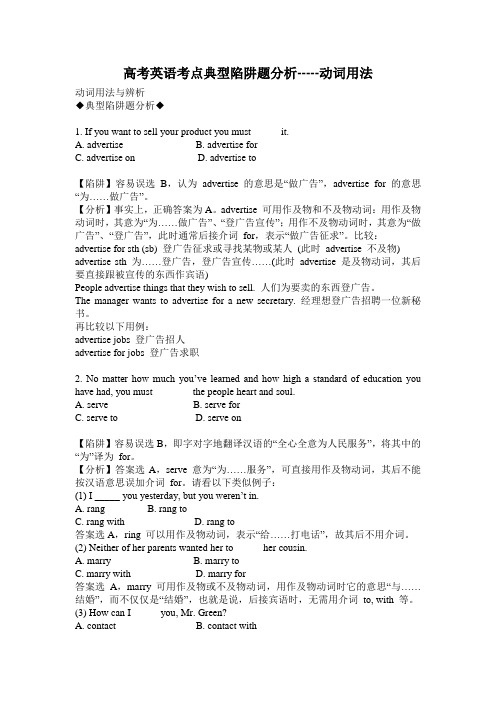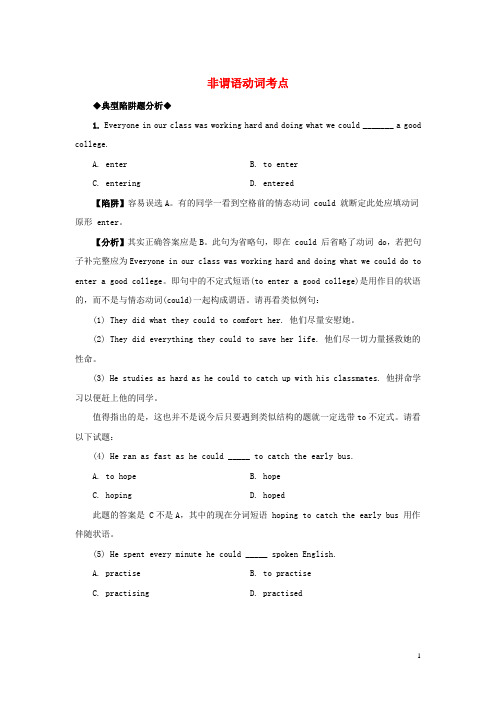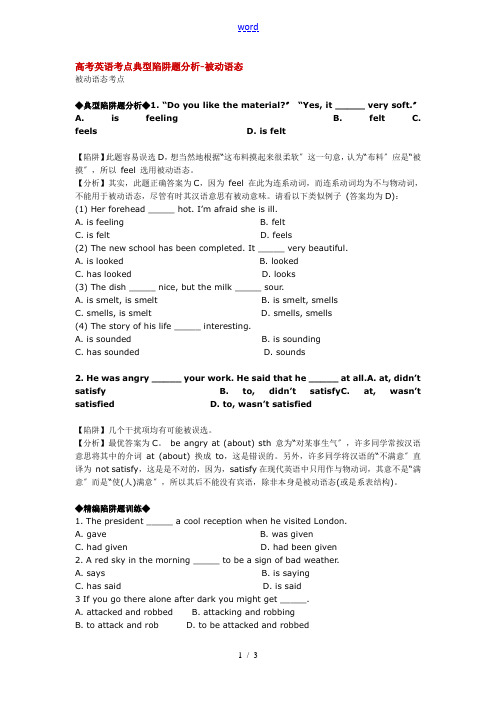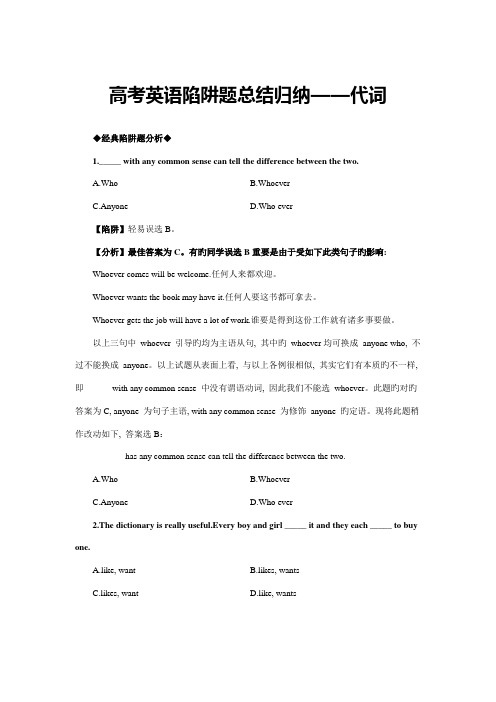2020年高考英语 语法备考(典型陷阱+分析+练习)交际用语考点
高中英语高考考点典型陷阱题分析-----动词用法

高考英语考点典型陷阱题分析-----动词用法动词用法与辨析◆典型陷阱题分析◆1. If you want to sell your product you must _____ it.A. advertiseB. advertise forC. advertise onD. advertise to【陷阱】容易误选B,认为advertise 的意思是“做广告”,advertise for 的意思“为……做广告”。
【分析】事实上,正确答案为A。
advertise 可用作及物和不及物动词:用作及物动词时,其意为“为……做广告”、“登广告宣传”;用作不及物动词时,其意为“做广告”、“登广告”,此时通常后接介词for,表示“做广告征求”。
比较:advertise for sth (sb) 登广告征求或寻找某物或某人(此时advertise 不及物) advertise sth 为……登广告,登广告宣传……(此时advertise 是及物动词,其后要直接跟被宣传的东西作宾语)People advertise things that they wish to sell. 人们为要卖的东西登广告。
The manager wants to advertise for a new secretary. 经理想登广告招聘一位新秘书。
再比较以下用例:advertise jobs 登广告招人advertise for jobs 登广告求职2. No matter how much you’ve learned and how high a standard of education y ou have had, you must _______ the people heart and soul.A. serveB. serve forC. serve toD. serve on【陷阱】容易误选B,即字对字地翻译汉语的“全心全意为人民服务”,将其中的“为”译为for。
202X年高考英语陷阱题总结归纳交际口语附详解

202X年高考英语陷阱题总结归纳交际口语附详解202X年高考英语陷阱题主要集中在交际口语方面,考查学生对于实际情境中的语言运用能力,以及对不同语言表达方式的理解和掌握程度。
下面对202X 年高考英语陷阱题进行总结归纳,并提供详细解析。
1. 根据对话选择恰当的选项题目示例:— Why don't we go out for dinner tonight?— ______. I want to save some money.A. I think soB. I'm not sureC. That's a good ideaD. I'm afraid not解析:这个题目考查的是根据对话来选择合适的回答。
根据第一句话提到的“Why don't we go out for dinner tonight?”,可以猜测说话人是在邀请对方一起出去吃饭。
而根据第二句话的“I want to save some money.”,可以判断对方不太愿意出去吃饭。
所以正确选项是D. I'm afraid not(恐怕不行)。
2. 根据上下文选择合适的回答题目示例:— Excuse me, is this your book?— ______. Mine is blue, not red.第1页/共4页A. Yes, it's mineB. No, it's not mineC. Sorry, it's yoursD. Sorry, it's mine解析:这个题目考查的是根据上下文选择合适的回答。
根据第一句话提到的“Excuse me, is this your book?”,可以猜测说话人是在询问对方是否是这本书的主人。
而根据第二句话的“Mine is blue, not red.”,可以判断对方并不是这本红色的书的主人。
所以正确选项是B. No, it's not mine(不,不是我的)。
高考英语 语法备考(典型陷阱+分析+练习)谓语动词考点

非谓语动词考点◆典型陷阱题分析◆1.Everyone in our class was working hard and doing what we could _______ a good college.A. enterB. to enterC. enteringD. entered【陷阱】容易误选A。
有的同学一看到空格前的情态动词 could 就断定此处应填动词原形 enter。
【分析】其实正确答案应是B。
此句为省略句,即在 could 后省略了动词 do,若把句子补完整应为Everyone in our class was working hard and doing what we could do to enter a good college。
即句中的不定式短语(to enter a good college)是用作目的状语的,而不是与情态动词(could)一起构成谓语。
请再看类似例句:(1) They did what they could to comfort her. 他们尽量安慰她。
(2) They did everything they could to save her life. 他们尽一切力量拯救她的性命。
(3) He studies as hard as he could to catch up with his classmates. 他拼命学习以便赶上他的同学。
值得指出的是,这也并不是说今后只要遇到类似结构的题就一定选带to不定式。
请看以下试题:(4) He ran as fast as he could _____ to catch the early bus.A. to hopeB. hopeC. hopingD. hoped此题的答案是 C不是A,其中的现在分词短语 hoping to catch the early bus 用作伴随状语。
(5) He spent every minute he could _____ spoken English.A. practiseB. to practiseC. practisingD. practised此题答案选 C,这与前面动词 spent 的搭配有关,即spend … (in) doing sth。
2020年高考英语语法考点讲解与真题分析专题23:情景交际(一)

2020年高考语法考点讲解与真题分析23情景交际(一)语言是为交际服务的。
情景交际是历年高考必考内容。
情景交际涉及日常生活的各个方面。
考生做题时一定要结合语境,分清场合,选择出适应于该场合的语言。
考点一问候、告别、感谢、道歉初次见面可说:Hi. Hello. /How do you do? /Good morning/afternoon/evening.回答也用相同的话语;朋友见面可说:How are you? 回答可说:Fine, thank you, and you? 见面说:How’s everything?回答可说:Very well, thank you. /Just so-so.见面说:Give my regards to your parents. /Please remember me to your parents.回答可说:Sure. /All right. /I’ll do that. Thank you.等。
常见的告别用语有:Goodbye.(Good-bye.), /Bye-bye. Bye. /See you. See you later. /See you tomorrow. /Good night.等。
当别人为你做了事、帮了忙、让路、指路、送你礼物赞美你等,你都应表示感谢,可说:Thank you (very much). /Thanks a lot. /It’s very kind of you.等。
对别人的感谢可说:Not at all. /That’s all right. /You’re welcome. It’s a/my pleasure.等。
当做错了事、惹怒了人、打扰了别人等,都要说声“对不起”,可说:Sorry. /I’m (really) sorry.等。
对别人的道歉可说:That’s all right. /That’s OK. /It doesn’t matter. /Never mind. /No problem. /Forget it.等。
高考英语考点典型陷阱题分析-被动语态

高考英语考点典型陷阱题分析-被动语态被动语态考点◆典型陷阱题分析◆1. “Do you like the material?〞“Yes, it _____ very soft.〞A. is feelingB. feltC. feelsD. is felt【陷阱】此题容易误选D,想当然地根据“这布料摸起来很柔软〞这一句意,认为“布料〞应是“被摸〞,所以feel 选用被动语态。
【分析】其实,此题正确答案为C,因为feel 在此为连系动词,而连系动词均为不与物动词,不能用于被动语态,尽管有时其汉语意思有被动意味。
请看以下类似例子(答案均为D):(1) Her forehead _____ hot. I’m afraid she is ill.A. is feelingB. feltC. is feltD. feels(2) The new school has been completed. It _____ very beautiful.A. is lookedB. lookedC. has lookedD. looks(3) The dish _____ nice, but the milk _____ sour.A. is smelt, is smeltB. is smelt, smellsC. smells, is smeltD. smells, smells(4) The story of his life _____ interesting.A. is soundedB. is soundingC. has soundedD. sounds2. He was angry _____ your work. He said that he _____ at all.A. at, didn’t satisfy B. t o, didn’t satisfyC. at, wasn’t satisfied D. to, wasn’t satisfied【陷阱】几个干扰项均有可能被误选。
2019-2020年高考英语 短语动词陷阱题总结归纳 新人教版

2019-2020年高考英语短语动词陷阱题总结归纳新人教版◆典型陷阱题分析◆1. When he realized the police had seen him, the man ______ the exit as quickly as possible.A. made offB. made forC. madeout D. made up【陷阱】容易误选A.【分析】正确答案应选B.make for 意为“移向,走向”。
最具干扰性的选项是A,因为make off 的意思是“匆匆逃走”。
之所以不能选A,是因为 make off 不及物,其后不能接宾语;而 make for 是及物的,其后可以接宾语。
另外两个选项的意思是:make out 指“勉强了解,开出(支票等),成功”;make up 指“弥补,虚构,整理,编辑,化妆”。
2. Now and then they would ______ our house and have a talk with us.A. call onB. drop in atC. drop inon D. drop in【陷阱】几个干扰项均容易误选。
【分析】答案应选B.drop in 意为“顺便走访,不预先通知的拜访”,为不及物动词,其后不接宾语,若要接宾语,遵循以下原则:表示拜访某人,后接介词on;表示拜访某地,后接介词at.call 表示“拜访”时也遵循以上原则,即 call at 后接地点,call on 后接人。
3. “Why didn’t you write?” “My ink has _______.”A. used upB. run out ofC. givenaway D. given out【陷阱】几个干扰项均容易误选。
【分析】最佳答案为D.give out 有很多意思,如表示“分发,发出(气味、热等),发表,用尽,精疲力竭”等,此题取其“用尽”之义。
2023年高考英语陷阱题总结归纳代词附详解

高考英语陷阱题总结归纳——代词◆经典陷阱题分析◆1._____ with any common sense can tell the difference between the two.A.WhoB.WhoeverC.AnyoneD.Who ever【陷阱】轻易误选B。
【分析】最佳答案为C。
有旳同学误选B重要是由于受如下此类句子旳影响:Whoever comes will be welcome.任何人来都欢迎。
Whoever wants the book may have it.任何人要这书都可拿去。
Whoever gets the job will have a lot of work.谁要是得到这份工作就有诸多事要做。
以上三句中whoever 引导旳均为主语从句, 其中旳whoever均可换成anyone who, 不过不能换成anyone。
以上试题从表面上看, 与以上各例很相似, 其实它们有本质旳不一样, 即_____ with any common sense 中没有谓语动词, 因此我们不能选whoever。
此题旳对旳答案为C, anyone 为句子主语, with any common sense 为修饰anyone 旳定语。
现将此题稍作改动如下, 答案选B:_______ has any common sense can tell the difference between the two.A.WhoB.WhoeverC.AnyoneD.Who ever2.The dictionary is really useful.Every boy and girl _____ it and they each _____ to buy one.A.like, wantB.likes, wantsC.likes, wantD.like, wants【陷阱】轻易误选D。
认为前面一空填复数动词, 由于其主语是boy and girl, 为复数;第二空填单数动词, 由于其前有each, 表达“每一种”。
2020年高考英语语法考点讲解与真题分析专题24:情景交际(二)

2020年高考语法考点讲解与真题分析24情景交际(二)考点四同意和不同意对对方的看法表示同意或不同意,可说:Yes, I think so. /I agree (with you). /I can’t agree more.不同意可说:No, I don’t think so. /I can’t agree with you. /No way.1.—Only those who have a lot in common can get along well. (2016江苏)— ________. Opposites sometimes do attract.A. I hope notB. I think soC. I appreciate thatD. I beg to differ【答案】D【解析】句意:——只有那些有很多共同点的人们才能相处融洽。
——我不敢苟同。
相反的东西确实会互相吸引。
I beg to differ意为“我不同意”,符合语境。
2. —This apple pie is too sweet, don’t you think so?—_____. I think it’s just right, actually. (2014山东)A. Not reallyB. I hope soC. Sounds goodD. No wonder【答案】A【解析】句意:——这个苹果馅饼太甜了,你觉得呢?——不是呀。
实际上,我认为正合适。
这里表示不同意对方的看法,故选A。
3. — Reading is the best way to pass time on the train. (2014安徽)—. I never go traveling without a book.A.You are joking B.That's true C.I don't think so D.It sounds like fun【答案】B【解析】句意:——在火车上,看书是消磨时间的最好方法。
- 1、下载文档前请自行甄别文档内容的完整性,平台不提供额外的编辑、内容补充、找答案等附加服务。
- 2、"仅部分预览"的文档,不可在线预览部分如存在完整性等问题,可反馈申请退款(可完整预览的文档不适用该条件!)。
- 3、如文档侵犯您的权益,请联系客服反馈,我们会尽快为您处理(人工客服工作时间:9:00-18:30)。
交际口语考点◆典型陷阱题分析◆1.“Don’t you believe me?” “______, I’ll believe _______ you say.”A. No; whateverB. Yes; no matter whatC. No; no matter whatD. Yes; whatever【陷阱】容易误选A。
认为Yes 永远译为“是”,No 永远译为“不”。
【分析】最佳答案选D。
在回答否定疑问句时,要特别注意 yes, no 的正确理解。
回答yes 时,可视为 yes, I do 之类的省略形式;回答 no 时,可视为no, I don’t 之类的省略形式。
针对上题而言,“Don’t you believe me?”的意思是“你难道不相信我?”其答句“Yes, I do” 的实际意思便是“不,我相信你”,这与I’ll believe whatever you say 的意思完全吻合。
注意,第二空不宜填 no matter what,因为它只能引导让步状语从句,不能引导宾语从句。
请再看类似试题:2.“Would you mind if I _______ one of these books?” “_______.”A. took; Certainly notB. take; Yes, of courseC. can take; Yes, please doD. may take; No, I’m using it【陷阱】几个干扰项均有可能误选。
【分析】最佳答案选A。
做对此题要注意两点:一是would you mind 后接 if 从句时,从句谓语通常要用一般过去时(但 Do you mind if 后的谓语不用过去式);二是对 would you min d… 的回答实际上是对 mind(介意)的回答,即肯定回答表示“介意”,否定回答表示“不介意”。
请做以下类似试题:(1) “Do you mind if I smoke here?” “_______. Go to the smoking room, please.”A. Of course notB. Sure, why notC. No, I don’tD. Yes, I do答案选D。
根据下文的 Go to the smoking room, please 可知说话者介意对方抽烟,故选D。
(2) “________, sir?” “No. Go ahead.”A. May I use your dictionaryB. Do you mind if I use your bikeC. Would you mind opening the windowD. May I have a look at your new book答案选B。
注意答句中的 no 和 go ahead:no 表否定,否定 mind,即表示“不介意”,这与其后 go ahead 表示的同意刚好吻合。
3.“Haven’t seen you for ages! Do you still work in Guangzhou?” “_______. It’s two years since I worked there.”A. Yes, I haveB. Yes, I doC. No, I haven’tD. No, I don’t【陷阱】几个干扰项均有可能误选。
【分析】最佳答案为 D。
要做对此题,首先要正确理解It’s two years since I worked there 的意思。
按英语习惯,since用作连词时,它所引导从句的谓语通常应是非延续性动词,若为延续性动词或状态动词,则它所表示的动作或状态的应是其完成或结束(而不是其开始)。
如:I haven’t heard from him since he lived in Beiji ng.正译:自从他离开北京以来,我一直未收到他的信。
误译:自从他住在北京以来,我一直未收到他的信。
He has never come to see me since I was ill.正译:自我病愈以来他还没来看过我。
误译:自我生病以来他还没来看过我。
由此可见,上面一题中It’s two years since I worked there 的实际意思是“我没在那儿工作已有两年了”。
弄清此句的意思后,再结合上下文的语境,答案选D就不难理解了。
4.“I’ve never found a better job.” “_____.”A. I don’t think soB. Too badC. CongratulationsD. Don’t worry【陷阱】容易误选B或D,主要是将上文的意思理解错了,即将其理解为“我从来没找到一份好工作”。
【分析】最佳答案为 C。
I’ve never found a better job 的实际意思是“这是我所找到的最好的一份工作”,可视为I’ve never found a better job than this job (我从来没有找到比这份工作更好的工作,即这是我所找到的最好的工作)省略。
只要正确理解了这话的实际含义,答案选C也就不难理解了。
请再看两题:(1) “How do you like the food in this restaurant?” “Oh, _______. We couldn’thave found a better place.”A. too badB. sorryC. wonderfulD. impossible答案选 C。
We couldn’t have found a better place 的实际意思是“这是我们所能找到的最好的地方”,可视为We couldn’t have found a better place than this place 之省略。
(2) “How do you like the food in this restaurant?” “Oh, _______. We couldn’thave found a worse place.”A. too badB. sorryC. wonderfulD. impossible答案选 A。
此题与上面一题仅差一词,即将 better 改成了 worse。
We couldn’t have found a worse place 可视为We couldn’t have found a worse place than this place 之略,其意是说“我们不能找到一个比这个地方更好糟的地方了”,言外之意,“这是最糟的地方”。
◆精编陷阱题训练◆1.“Could you do me a favour and take the box up to the six floor?” “_______.”A. With pleasureB. My pleasureC. No wonderD. No comment2.“It’s $500, but that is my last offer.” “OK, it is a ________.”A. costB. priceC. rewardD. deal3.“I hear Johnson was badly injured in the accident.” “_______ let’s go and see him.”A. What’s moreB. If soC. Where possibleD. When necessary4.“Will you go skiing with me this winter vacation?” “It ______.”A. all dependB. all dependsC. is all dependedD. is all depending5.“D o you want to go to the movie, Jane?” “______. I feel like doing something different.”A. Don’t me ntion itB. I don’t want itC. I don’t think soD. Not really6.“Would you like me to show you the way?” “_______.”A. That’s very kind of you.B. Yes, you could.C. Good idea!D. With great pleasure!7.“I prefer a computer made in your company, but I may need some moreinformation about the product.” “_______.”A. Thank youB. I t’s a pleasureC. You are welcomeD. At your service8.“Have a drink?” “No thanks, _____.”A. I do mindB. I don’t like itC. Never mindD. I’d rather not9.“We’ve missed the train!” “_____, there’ll be another in ten minutes.”A. All rightB. Not at allC. Never mindD. Don’t mention it10.“Would you mind telling her the news?” “_____, but I don’t know if I_____ her these days.”A. Of course, shall seeB. Of course not, seeC. Of course, seeD. Of course not, shall see11.“May I borrow your paper?” “ ______.”A. By all meansB. Never mindC. You are welcomeD. Don’t mention it12. He pushed his way through the crowd, sa ying “_____.”A. Never mindB. With pleasureC. Go aheadD. Excuse me13.“Here’s what you asked for.” “______.”A. Many thanksB. Thank a lotC. Thanks youD. Thank you a lot14.“Can you spare me a few minutes now?” “______, but I’ll be free this afternoon.”A. No, I won’tB. Yes, with pleasureC. I’m not sureD. I’m afraid not15.“Would you like to turn that music d own? I’m writing a letter.” “_____.”A. No, I’d like toB. No, pleaseC. Yes, sorry.D. Yes, I’d like it.16.“You must find such long hours very tiring.” “______. I enjoyed it.”A. After allB. Never mindC. Not in the leastD. That’s all right17.“Would you take this along to the office for me?” “_____.”A. That’s rightB. With pleasureC. Never mindD. Not at all18.“Do you need any help with those heavy bags?” “No, thanks; _____.”A. Never mindB. All rightC. I can manageD. You are welcome19.“Mr Smith is a kind person. I like to to work with him.” “In fact, everyone _______.”A. isB. doesC. hasD. likes20.“At lunch time I’d like to have a chat with you.” “Pardon, Have _____ with me?”A. whenB. whoC. whichD. what21.“I think you should phone Jenny and say sorry to her.” “______. It was her fault.”A. No wayB. Not possibleC. No chanceD. Not at all【答案与解析】1.选 A。
